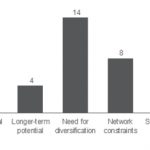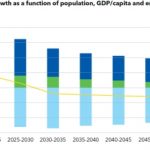Global energy intensity – a measure of how efficiently the global economy uses energy – improved by just over 2% in 2022. That needs to double to 4% annually to 2030 to meet global efficiency targets, explains Brian Motherway at the IEA. If achieved, by 2030 one unit of energy used will generate 40% more economic output than today. That’s huge, and shows why few other policy areas offer such widespread benefits. More than half of the 150 … [Read more...]
Poorly defined “efficiency” incentives birthed the SUV. Beware the same mistake with “clean energy” jobs, “domestic” batteries + more
Financial support for the transition needs clear and carefully chosen definitions of what qualifies for that support. Getting it wrong leads to unintended consequences, some which may not reduce emissions, explains James Sallee at the Energy Institute at Haas. Ever wondered why SUVs and big cars proliferated after the 1970s in the U.S. (and are on roads all over the world now)? The 1970s oil crisis triggered new rules that penalised fuel … [Read more...]
Geothermal Heat Pumps: can new U.S. “IRA” support make it go mainstream?
Biden’s Inflation Reduction Act in the U.S. is meant to drive forward the best clean energy solutions. To help make sure geothermal heat pumps play their fullest role, RMI has done a study of its benefits as well as published guides on how developers can take advantage of the various new laws and support mechanisms. Lauren Reeg, Mike Henchen, Chris Potter and Chris Stone at RMI start with a summary of the technology and its applications, before … [Read more...]
IEA’s new CCUS projects database: a tool for driving much needed progress
The IEA has made available for the first time its CCUS projects database. The number of countries with plans to develop CCUS now stands at 45, with seven more countries - in central and southern Europe, the Middle East, and Southeast Asia – joining the list in 2022. The database covers CO2 capture, transport, storage, and utilisation projects worldwide commissioned since the 1970s, and have an announced capacity of more than 100,000 tonnes/year … [Read more...]
What is the future of Woody Biomass in the EU energy mix?
Simon Göss provides an overview of the main issues surrounding the intense policy debate over the future of biomass in the EU. The current proposals of the EU parliament still allow certain woody biomass to be used for all kinds of energy purposes but limits the share that primary woody biomass can contribute towards renewable energy targets. Included in the proposals is a new definition of primary woody biomass, and a phase-out of financial … [Read more...]
Making Hydrogen will consume 2% of total global renewable capacity growth by 2027
25 countries plus the EU have announced big ambitions for renewable hydrogen production. But how much renewable energy will be needed to make the H2 over the next five years? Nations are not keen to expend new clean energy generation on (expensive today) hydrogen production when their grids are still not emissions-free. According to the IEA, for 2022-2027, their main case forecasts around 50GW of renewable capacity will be dedicated to hydrogen … [Read more...]
Investing in Hydrogen: is there a “first mover advantage”?
Is there a “first mover advantage” – or not - for an investor in the new hydrogen economy? Michiel Korthals Altes offers a series of “tests” of investment decisions based on the following criteria: economics, climate efficiency, system optimum, price stability, regulation, technology, now and in the future. He concludes that until the sector reaches maturity, conversion inefficiencies make the production of hydrogen a poor choice for most … [Read more...]
A pathway for profitable CCS in California
A study from the energy departments of Stanford University, from where Kara Glenwright writes, lays out a pathway for California to capture and store up to 60 Mt (million tonnes) of CO2 a year. 76 site locations have been identified where work could start immediately to store 20 Mt/yr profitably under the existing low carbon rules. But first a raft of clarifications on the laws is needed, showing that the success of CCS doesn’t just depend on the … [Read more...]
U.S.: Counting Renewables jobs and projects under threat, what can be done and why
All sectors across all economies are trying to add up their potential job losses and projects in jeopardy, then telling their governments to prioritise them for Covid lockdown support. Mike Jacobs at the Union of Concerned Scientists looks at renewables in the U.S. He quotes news reports that over 100,000 workers in this fast-growing industry filed for unemployment in March 2020. On top of that, the already planned expiry and phase-down of … [Read more...]
Covid-19 and the EU car industry: any support should lock in EV targets
The coronavirus slump has come suddenly and hit hard. The deep thinking has already begun on the economics needed to turn around that slump without damaging our rising emissions ambitions. Julia Poliscanova at Transport & Environment looks at the car industry. Some have called for the new CO2 standards coming in 2020 to be postponed (though, notably, VW and BMW still support them). She explains that total car sales were already declining in … [Read more...]
Tech-Neutral Auctions for Renewable Energy: are poorly defined rules creating loopholes?
The EC’s Environmental and Energy State Aid Guidelines 2014-2020 (EEAG) require Member States to implement technology-neutral auctions as part of their renewable energy support schemes. However, the reality looks quite different, write Bastian Lotz and Silvana Tiedemann from Navigant (a Guidehouse company), Lars Jerrentrup of Aurora Energy Research, and Lion Hirth from Neon. Most Member States continue to use technology-specific auctions, using … [Read more...]
Peak Energy by 2030: Efficiency gains will make the Transition affordable
We can’t afford the energy transition? Next time you hear that from someone, perhaps you can show them this. Sverre Alvik at DNV GL explains that, according to their latest Energy Transition Outlook, although annual global energy expenditure will have to increase from $4.6tn in 2017 to $5.5tn in 2050, its share of growing world GDP will almost halve from 3.6% to 1.9%. That’s because continuing energy efficiency gains are making sure that total … [Read more...]













